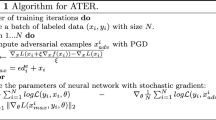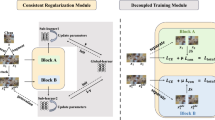Abstract
The fact that deep neural networks are susceptible to crafted perturbations severely impacts the use of deep learning in certain domains of application. Among many developed defense models against such attacks, adversarial training emerges as the most successful method that consistently resists a wide range of attacks. In this work, based on an observation from a previous study that the representations of a clean data example and its adversarial examples become more divergent in higher layers of a deep neural net, we propose the Adversary Divergence Reduction Network which enforces local/global compactness and the clustering assumption over an intermediate layer of a deep neural network. We conduct comprehensive experiments to understand the isolating behavior of each component (i.e., local/global compactness and the clustering assumption) and compare our proposed model with state-of-the-art adversarial training methods. The experimental results demonstrate that augmenting adversarial training with our proposed components can further improve the robustness of the network, leading to higher unperturbed and adversarial predictive performances.
Access this chapter
Tax calculation will be finalised at checkout
Purchases are for personal use only
Similar content being viewed by others
Notes
- 1.
The performance of TRADES is influenced by the model architectures and parameter tunings. The works [10, 20] also reported that TRADES cannot surpass ADV all the time which explains the lower performance of TRADES on ResNet architecture in this paper. More analysis can be found in the supplementary material.
References
Athalye, A., Carlini, N., Wagner, D.: Obfuscated gradients give a false sense of security: circumventing defenses to adversarial examples. arXiv preprint arXiv:1802.00420 (2018)
Carlini, N., Wagner, D.: Towards evaluating the robustness of neural networks. In: 2017 IEEE Symposium on Security and Privacy (SP), pp. 39–57. IEEE (2017)
Chapelle, O., Zien, A.: Semi-supervised classification by low density separation. In: AISTATS, vol. 2005, pp. 57–64 (2005)
Chen, T., Kornblith, S., Norouzi, M., Hinton, G.: A simple framework for contrastive learning of visual representations. arXiv preprint arXiv:2002.05709 (2020)
Dhillon, G.S., et al.: Stochastic activation pruning for robust adversarial defense. arXiv preprint arXiv:1803.01442 (2018)
Goodfellow, I.J., Shlens, J., Szegedy, C.: Explaining and harnessing adversarial examples. arXiv preprint arXiv:1412.6572 (2014)
Gulrajani, I., Ahmed, F., Arjovsky, M., Dumoulin, V., Courville, A.C.: Improved training of Wasserstein GANs. In: Advances in Neural Information Processing Systems, pp. 5767–5777 (2017)
He, K., Fan, H., Wu, Y., Xie, S., Girshick, R.: Momentum contrast for unsupervised visual representation learning. In: Proceedings of the IEEE/CVF Conference on Computer Vision and Pattern Recognition, pp. 9729–9738 (2020)
Jakubovitz, D., Giryes, R.: Improving DNN robustness to adversarial attacks using Jacobian regularization. In: Ferrari, V., Hebert, M., Sminchisescu, C., Weiss, Y. (eds.) ECCV 2018. LNCS, vol. 11216, pp. 525–541. Springer, Cham (2018). https://doi.org/10.1007/978-3-030-01258-8_32
Jalal, A., Ilyas, A., Daskalakis, C., Dimakis, A.G.: The robust manifold defense: adversarial training using generative models. arXiv preprint arXiv:1712.09196 (2017)
Kannan, H., Kurakin, A., Goodfellow, I.: Adversarial logit pairing. arXiv preprint arXiv:1803.06373 (2018)
Krizhevsky, A., et al.: Learning multiple layers of features from tiny images (2009)
Kurakin, A., Goodfellow, I., Bengio, S.: Adversarial machine learning at scale. arXiv preprint arXiv:1611.01236 (2016)
LeCun, Y., Bottou, L., Bengio, Y., Haffner, P.: Gradient-based learning applied to document recognition. Proc. IEEE 86(11), 2278–2324 (1998)
Lin, J., Gan, C., Han, S.: Defensive quantization: when efficiency meets robustness. arXiv preprint arXiv:1904.08444 (2019)
Maaten, L.V.D., Hinton, G.: Visualizing data using t-SNE. J. Mach. Learn. Res. 9(Nov), 2579–2605 (2008)
Madry, A., Makelov, A., Schmidt, L., Tsipras, D., Vladu, A.: Towards deep learning models resistant to adversarial attacks. arXiv preprint arXiv:1706.06083 (2017)
Miyato, T., Maeda, S., Koyama, M., Ishii, S.: Virtual adversarial training: a regularization method for supervised and semi-supervised learning. IEEE Trans. Pattern Anal. Mach. Intell. 41(8), 1979–1993 (2019)
Oord, A.v., Kalchbrenner, N., Kavukcuoglu, K.: Pixel recurrent neural networks. arXiv preprint arXiv:1601.06759 (2016)
Qin, C., et al.: Adversarial robustness through local linearization. In: Advances in Neural Information Processing Systems, pp. 13824–13833 (2019)
Samangouei, P., Kabkab, M., Chellappa, R.: Defense-GAN: protecting classifiers against adversarial attacks using generative models. arXiv preprint arXiv:1805.06605 (2018)
Shafahi, A., et al.: Adversarial training for free! In: Advances in Neural Information Processing Systems, pp. 3353–3364 (2019)
Shu, R., Bui, H.H., Narui, H., Ermon, S.: A dirt-t approach to unsupervised domain adaptation. arXiv preprint arXiv:1802.08735 (2018)
Song, Y., Kim, T., Nowozin, S., Ermon, S., Kushman, N.: PixelDefend: leveraging generative models to understand and defend against adversarial examples. arXiv preprint arXiv:1710.10766 (2017)
Szegedy, C., et al.: Intriguing properties of neural networks. arXiv preprint arXiv:1312.6199 (2013)
Xie, C., Wu, Y., Maaten, L.v.d., Yuille, A.L., He, K.: Feature denoising for improving adversarial robustness. In: Proceedings of the IEEE Conference on Computer Vision and Pattern Recognition, pp. 501–509 (2019)
Zhang, H., Yu, Y., Jiao, J., Xing, E.P., Ghaoui, L.E., Jordan, M.I.: Theoretically principled trade-off between robustness and accuracy. arXiv preprint arXiv:1901.08573 (2019)
Acknowledgement
This work was partially supported by the Australian Defence Science and Technology (DST) Group under the Next Generation Technology Fund (NTGF) scheme.
Author information
Authors and Affiliations
Corresponding author
Editor information
Editors and Affiliations
1 Electronic supplementary material
Below is the link to the electronic supplementary material.
Rights and permissions
Copyright information
© 2020 Springer Nature Switzerland AG
About this paper
Cite this paper
Bui, A. et al. (2020). Improving Adversarial Robustness by Enforcing Local and Global Compactness. In: Vedaldi, A., Bischof, H., Brox, T., Frahm, JM. (eds) Computer Vision – ECCV 2020. ECCV 2020. Lecture Notes in Computer Science(), vol 12372. Springer, Cham. https://doi.org/10.1007/978-3-030-58583-9_13
Download citation
DOI: https://doi.org/10.1007/978-3-030-58583-9_13
Published:
Publisher Name: Springer, Cham
Print ISBN: 978-3-030-58582-2
Online ISBN: 978-3-030-58583-9
eBook Packages: Computer ScienceComputer Science (R0)




